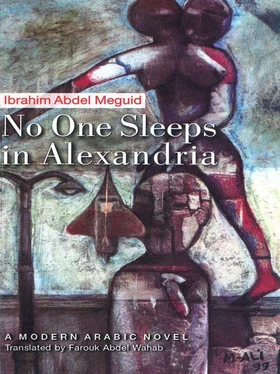
“How old are you, Zahra?” Sitt Maryam asked.
“Twenty,” replied Zahra.
Camilla, Yvonne, and their mother all asked at once, “Is this the first time you’ve seen Alexandria?” “Yes.”
“And your husband, why didn’t he rest today after the trip?” was Sitt Maryam’s next question.
“He’s like that. He doesn’t like to be lazy.”
“God be with him. Nobody finds a job easily these days.”
“God will provide.”
Zahra paid 160 piasters, two months rent, for the room. She went in and found it to be a big room, but its window opened onto an air shaft rather than the street. “That’s fine,” she told herself. She felt close to this lady and her daughters. Sitt Maryam asked her if she had more money to furnish the room and she said yes. So Sitt Maryam asked her if she would like to do it that day. Zahra thought a little then said to herself, “Why not? It wouldn’t be bad if Magd al-Din came back and saw the new room with furniture.” She agreed, and Sitt Maryam got up and went into the inner room to put on her street clothes. Zahra, casting a quick glance at the inner room, saw a brass bed with high posts surrounded by a white mosquito net, exactly like her bed in the village, except that the posts of her bed had been discolored in spots. She would buy another one like it today.
Sitt Maryam closed the door quickly. The two girls were once again staring at Zahra. This time she felt embarrassed, so she lowered her head and stared down at the plain kilim on the floor, looking for lines and colors that she did not see. Camilla got up quickly and opened the little cabinet under the radio and took out a magazine, then sat next to Zahra and opened it to a particular page and asked Zahra, “Do you know Asmahan?”
“Yes.”
“Do you like her voice?”
“When I hear it.”
The girls burst out laughing. Camilla offered the magazine to Zahra. “This is her picture.”
Zahra looked at Asmahan’s splendid face, which she had never seen before. As she studied her beautiful eyes and the beauty mark on her face, she wondered, “Is she really that beautiful?”
Camilla had more questions. “Do you have a radio in the village?”
“We have three — one in the mayor’s house, one in the coffeehouse, and one in our house.”
A look of pain appeared on her face and everyone was quiet. Zahra wiped a tear before it formed in her eye. Camilla turned another page in the magazine to show a bright-faced woman, with brown lipstick on her full lips, wearing a tight dress that showed her curves in reckless playfulness. “This is Esther Williams,” she said. “Do you have a cinema in the village?”
Sitt Maryam came out just then, laughing and saying to Zahra, who had begun to feel overwhelmed, “Camilla’s mischievous, Zahra.”
Zahra did not comment. Her attention was drawn to the black dress that did not reach Sitt Maryam’s feet and the semi-transparent veil with the gold pin that draped across her nose. Zahra laid Shawqiya down on the sofa and said, “This is the first time I’ve ever left Shawqiya.”
“We’ll be back soon, before lunch. Camilla will look after her, Would you like to have lunch with us, or don’t you like the food of the Copts?”
Zahra felt slightly at a loss. It surprised her that she had never eaten or drunk anything at the house of Firyal, the village seamstress. She had heard, as a young girl, women talking about the bad smell of Coptic food. “You are good. Your food must also be good,” she murmured.
Sitt Maryam took her gently by the hand, and they went out,

Sitt Maryam walked confidently along the sidewalk, but Zahra could not take her eyes off the unpaved ground. That was why she was two or three steps behind. It was hard to walk on the street covered with little white stones; the sidewalk, also unpaved, was higher than the street and lined with rectangular basalt blocks that were covered with sand and small stones in preparation for tiles to be installed. “Watch out, there’s hole for a drain,” or “There’s a water main,” Sitt Maryam said from time to time. Zahra would stop for a moment and cautiously step around what Sitt Maryam warned her about.
“This is the streetcar. Have you seen it, Zahra?”
“Last night.”
“Let’s get on it. Remember the number — it’s eight. It goes to Abu Warda.”
On the streetcar Sitt Maryam led her to the women’s compartment. “Who’s Abu Warda?” asked Zahra.
Sitt Maryam smiled. “It’s a street in Bahari.”
Zahra noticed that there were three women who had gotten on the streetcar before them who sat silently, their faces veiled.
“We’ll get off at Attarin,” Sitt Maryam told her. “This streetcar goes around in a circle, from here to Attarin, then Abd al-Munim Street, then Istanbul Street, and Safiya Zaghloul and the Chamber of Commerce, then Manshiya and Bahari from Tatwig street, and comes all the way back with the same ticket — something of a joy ride.”
Zahra did not say anything. She could not understand how anyone could spend all that time on the streetcar. It seemed to her that women here had no work to do. She smiled. The streetcar moved and she was taken aback for a moment, her heart beating fast. How could she have left the house without her husband’s permission? How could she have left her baby daughter with people she had just met for the first time? Was it enough that Bahi said they were good people? And since when did Bahi say anything useful? But she could not go back. The vast white space captivated her eyes, and she gave in to it. Where was this city taking her?
She let herself study the two- and three-story homes, with their narrow doors opening onto silent courtyards. The old facades had balconies on which a few items of wash hung haphazardly to dry. A few stores had opened their doors. She noticed that Sitt Maryam paid the conductor a half-piaster coin and took back a millieme and two tickets. Sitt Maryam saw her looking at the broad window of a store where the streetcar had stopped, a window displaying pots and pans and beautiful china and glassware. She told her these were Ahmad Ibrahim’s stores, the most popular stores in Karmuz and Raghib, and that they could buy whatever Zahra needed on their way back from getting the furniture.
Zahra found herself adjusting to the slow flow of movement around her in the street, and to passengers getting on and off the streetcar. Suddenly, though, she was overcome by a strange smell, and they were in the middle of a street crowded with butcher shops, with carts piled high with cow, water buffalo, and sheep feet and heads and organs, lined with stores displaying small slaughtered sheep with clear red stamps, and filled with a crowd of women wearing black body wraps.
“Let’s get off here. This is Bab Umar Pasha. We’ll cross Khedive Street and go into Attarin.
They got off. Zahra’s eyes could not settle on any one thing for long. A refreshing breeze in Khedive Street began to soothe her. She noticed that the first floors of the houses were predominantly dull. The stores in Attarin were now all open and showed long, deep interiors that looked like manufacturing shops. Zahra looked up several times at the balconies.
The houses here were huge, taller than any she had seen so far. The doors were wide and the spaces inside enormous, filled with cardboard boxes and other things she did not recognize. The balconies were beautiful, resting on supports shaped like animals — little lions, tigers, and rams. The balconies had railings of shiny, black and green wrought iron. A few women stood on the balconies hanging out laundry, while a few others sat in the sun. Many of them were old, with loose gray or henna-colored hair and flabby white arms that could be seen, bare, through the railings. Zahra smelled the water sprayed on the ground in front of the stores. In more than one small alley she saw small cafés in which one or two patrons sat smoking narghiles or reading the papers.
Читать дальше













